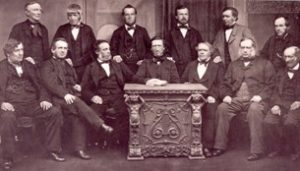A blog mainly intended for participants on the Barefoot Co-op Development programme, but may be of interest more widely.
In the first of two sessions on ‘Co-operative Ways of Working’ we looked at the typical governance problems that can arise and discussed a range of collaborative tools useful for working with co-operative clients to resolve governance issues.
Here are some of them. I have suggested how they might be used, but of course it’s up to you! I’m sure you will find ways to adapt them for different co-op clients.
MODELLING AN EFFECTIVE MEETING
3 tools for effective meetings
Different decision-making methods – pros and cons
Sociocracy tools
Seeds for Change on consensus decision-making
Seeds for Change consensus video
A DAY IN THE LIFE
An exercise that can help a start up co-op decide what teams/departments it needs. However this exercise also be useful with an existing co-op where there is role confusion &/or conflict over who does what. There are five steps:
Step 1: In pairs or trios, ask them to think up a typical day (or week) in their co-op. Make a list of all the decisions that need to be taken. Share and make a list of all the decisions, there maybe duplication, discuss and reduce the list to 10 typical decisions. Number them 1 – 10.
Step 2: All together agree a list of the different locations in the co-op where decisions can be made (for example individual job description, ad hoc meeting with other member; monthly GM, AGM etc.) Identify them A, B, C etc.
Step 3: Again in pairs or trios (or larger groups, depending on the number of participants) the task is to decide WHERE each of those typical decisions currently gets taken (not where it should, but where it does).
Step 4: Share and be amazed at how different (or not) their responses are.
Step 5: Facilitate a debate about how effective their current structure and/or procedures are. What is working well? Where are the overlaps/gaps? What needs tweaking? Encourage them to delegate a person or a couple of people to make a note of the key points (perhaps under those headings) and write up a proposal for the next GM.
AGILE RETROSPECTIVE TECHNIQUE
Most online references are for software development firms using Agile management techniques. I learnt this technique from a colleague who had learnt it in a software environment. (Thank you @simoncopsey) One of the things I like about this approach is that it’s a way of confronting conflict in the team without calling it conflict. Here’s a blog from Toptal, that provides more detail about the process.
SOCIOCRACY TOOLS
Rounds, consent decision making
INFLUENCE GAME
This one is a favourite, a good warm up but with a rich vein of learning for everyone.
- Get all the participants either in a large room or outdoors. As them to spread out and fill up the space. Then ask them to each pick two fellow members (they shouldn’t speak, or point, the people they pick should not know they’ve been chosen).
- Explain that their job is to locate themselves physically in space equidistant from both people. Expect lots of laughter and giggling as the room moves around. Might take some time, but eventually it will settle down and everyone will stop moving.
- This is your cue to ask them how they felt about doing that. Then ask what they thought was happening? What might we learn from this exercise? Hopefully someone will say that they didn’t know who was following them. (If no-one says that, ask if anyone suspected who was following them). This for me is the first learning point and one that we can relate to power and influence. We all have power to influence people, but we often have no idea who is being influenced by us. We influence others by our behaviour, as well as what we might say or write.
- Now ask one person to step out of the group. And repeat your instructions of earlier. This will cause everything to change, as people need to find others to follow. Again, lots of laughter and moving around but eventually it will quieten down and everyone will stop moving.
- Ask again, what happened when one person left the group? Everything changed. Remind them about the group dynamics model of forming, storming, norming, performing. These stages of group development (perhaps not all of them and not necessarily in that order) will happen every time people leave or new people join a group.
- What can we learn? For me, one important lesson references co-operative culture. That if you understand the importance of a strong co-operative culture and do your best to build and maintain it, others will follow your example. You will be walking the talk.
SWOT ANALYSIS
The Mindtools explanation linked above is intended for private enterprise, but a SWOT analysis works well in co-ops too. It’s helpful to clarify that strengths and weaknesses tend to be internal to the organisation, while opportunities and threats are external. Also you will find that a weakness can become a strength, but of course you have to recognise and acknowledge it first.
TIMELINE
Excellent warm up, especially in a big co-op where people in different teams don’t get to talk to each other much.
Get everyone in a line according to when they became a member of the co-op. Then divide them into ‘age’ groups – the old timers, maybe a couple of groups in the middle and the newbies. They can chat and reminisce or share confusion or whatever, but they need to record an overall impression, to be shared with the other groups, of what the co-op feels like for them. Then after 15 minutes (or longer if time) go round the groups getting them to share their stories. Expect revelations!
HERZBERG EXERCISE
A blog by Nathan Brown, adapted for use as a tool for exploring motivation in co-ops by Bob Cannell.
Worker co-ops are set up for the benefit of members, but how do we know what members want? Herzberg says that people have different motivations for going to work, which he divides into four:
two ‘hygiene’ factors:
-
- pay & security
- great place to work
& two ‘motivational’ factors:
-
- ethics & respect
- challenge & personal development
The exercise:
Draw up a flip chart with 4 quadrants:
-
- pay & security
- great place to work
- ethics & respect
- challenge & personal development
Give each person 6 sticky dots. They have to stick them on the quadrant that most closely describes what motivates them to come to work in their co-op every day. They can distribute the dots as they like.
Feedback and discussion might include:
-
- different ways in which people are motivated
- how can this information help us with strategic planning?
APPRECIATIVE INQUIRY
A positive, ‘glass half full’ approach, involving four stages:
-
- Discover: Focus on what’s working, build on success. What are our strengths? What do we enjoy? What do we want to do more of?
- Dream: Use our strengths and what we want to do to create a shared vision of the future – what might be?
- Design: Co-create a design to make it happen, based on our values and principles
- Deliver: What will be? Sustain the vision through empowering people, learning, adjusting and improvising
 gned by a committee, they say. Jolly well designed some might say (me) given their usefulness and amazing capacity to withstand desert heat and they have three sets of eyelids and two rows of eyelashes to keep sand out of their eyes and can completely shut their nostrils during sandstorms!
gned by a committee, they say. Jolly well designed some might say (me) given their usefulness and amazing capacity to withstand desert heat and they have three sets of eyelids and two rows of eyelashes to keep sand out of their eyes and can completely shut their nostrils during sandstorms! 5, as the Rules of the Rochdale Equitable Pioneers Society were adopted by the International Co-operative Alliance as International Co-operative Principles.
5, as the Rules of the Rochdale Equitable Pioneers Society were adopted by the International Co-operative Alliance as International Co-operative Principles.
